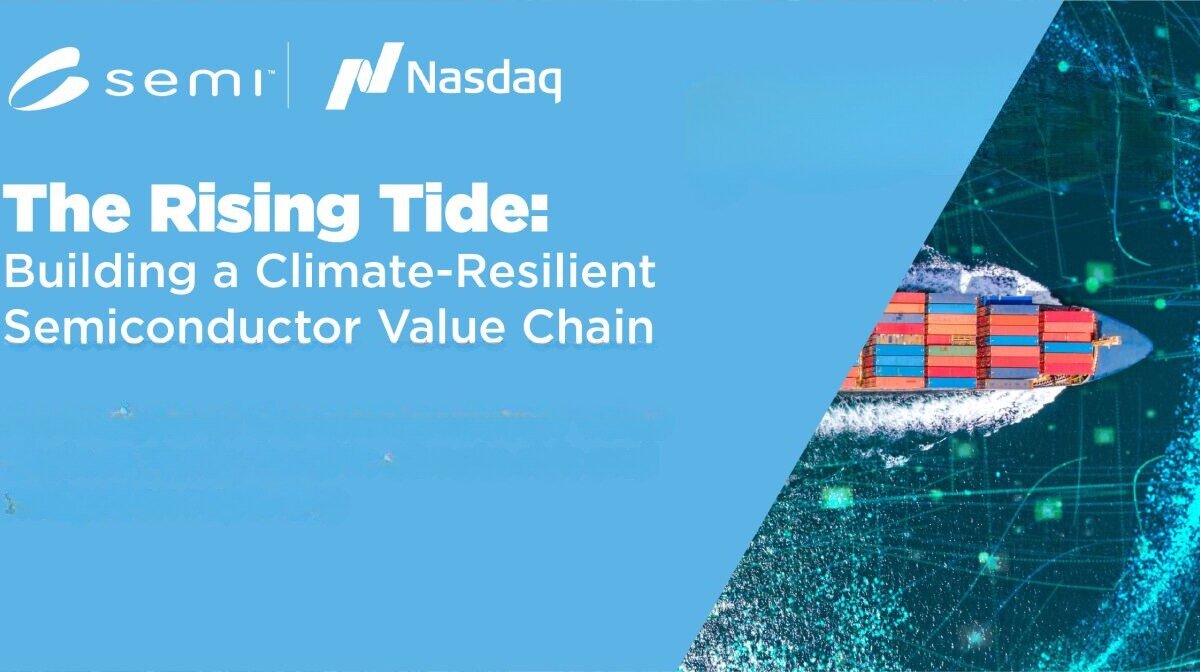MILPITAS, Calif. — May 8, 2024 — SEMI today released the report A Rising Tide: Building a Climate-Resilient Semiconductor Value Chain that spotlights the maturity of the semiconductor value chain as it strives toward greater climate resilience and develops climate risk mitigation strategies. Led by the SEMI Sustainability Initiative Environmental Risk Mitigation and Reporting (ERMR) working group, the study identifies strengths, gaps and challenges faced by the industry in implementing recommendations of the Taskforce on Climate-related Financial Disclosures (TCFD). The report also offers recommendations on industry best practices to enhance climate disclosure maturity. Download the report.
The report leveraged Nasdaq Sustainable Lens™, an AI-powered ESG intelligence platform, to analyze and assess the maturity level of each segment of the semiconductor value chain based on publicly available sustainability and climate information of 100 leading semiconductor companies against TCFD recommendations. Nasdaq Sustainable Lens™ reviewed over 2,200 corporate annual financial reports, sustainability reports, low-carbon transition and climate action plans and other sustainability and climate information released between 2021 and 2023. The platform uncovered five key takeaways:
- Maturity of semiconductor industry-level climate disclosures are in the Established phase as defined by Nasdaq. The semiconductor companies included in the assessment showed 40% higher TCFD alignment than the market average, represented by over 9,000 global companies across all industries beyond semiconductors.
- Corporate climate reporting varies by semiconductor value chain segment largely due to different stakeholder expectations, jurisdiction-level reporting requirements, the level of resources dedicated to corporate climate work, as well as board- and executive-level engagement in climate initiatives.
- Companies prioritize near-term climate targets, though only some have set long-term net zero goals. On average, value chain segments demonstrated the most comprehensive TCFD alignment with the Metrics & Targets pillar, particularly as it relates to near-term greenhouse gas (GHG) emissions reduction targets.
- Addressing organizational resilience to climate change appears to be the biggest industry-level challenge. The most underreported categories included climate scenario analysis, quantitative physical, and transition climate risk assessments, and setting an internal carbon price. This indicates that the core question of how a company’s business strategy will perform under various climate scenarios remains a major gap across all semiconductor value chain segments.
- Ensuring climate resilience of the value chain is a business imperative for semiconductor companies. Industry-level recognition of the vulnerability of the semiconductor value chain to existing and potential climate-related risks and proactively building a path toward climate resilience are crucial for long-term business continuity.
“Our study aims to raise awareness of climate risk as a key business risk and demonstrate an important role that climate resilience plays in ensuring business continuity and long-term resilience of the semiconductor value chain,” said Alua Suleimenova, Senior Sustainability Program Manager at Marvell and leader of the ERMR working group. “This analysis will inform business leaders’ decisions around measuring and reporting on corporate climate action. Further, this study can help SEMI members enhance the transparency of their climate disclosures in alignment with emerging reporting requirements, including the TCFD recommendations, which are now housed within the International Sustainability Standards Board (ISSB).”
“The analysis made possible by Nasdaq Sustainable Lens™ is a key step forward in understanding and improving sustainability risk assessment and reporting across the semiconductor value chain,” said Dr. Mousumi Bhat, Vice President of Global Sustainability Programs at SEMI. “Marvell’s leadership and the companies that provided case studies were crucial to delivering these important insights.”
Webinar on Report
SEMI and Nasdaq will host a webinar titled Climate Risk as a Business Risk on May 23, 2024, at 9:00am PT that will highlight key takeaways from the A Rising Tide: Building a Climate-Resilient Semiconductor Value Chain report. Registration is open.
About the SEMI Sustainability Initiative
The SEMI Sustainability Initiative works to accelerate the development of climate solutions for the semiconductor value chain through collaboration, communications, alignment and guidelines development. The Initiative consists of Working Groups collaborating on topics such as materiality, risk mitigation and reporting, climate equity, social justice, carbon markets and circularity. It also includes the Semiconductor Climate Consortium (SCC), whose members collaborate to help their organizations set and pursue net zero goals to reduce greenhouse gas emissions.



















